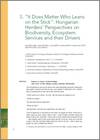The Regional Pasture Knowledge Exchange Network is a platform that connects policy makers, practitioners and researchers in Central Asia, China and Mongolia to exchange knowledge and share experience on pasture management. Its E-library stores a variety of documents in English, Russian and Kirghiz on pastures, natural resources management and climate change.
Year of publication: 2016Organization: German Agency for International Cooperation (GIZ)
Topic: Economy, Environmental services, Food security, Land
Language: English, Deutsch, Кыргыз тили, Русский
Type of document: Databases
Geographical coverage: Central Asia
An emerging narrative points to global warming as a driver of conflict in the Sahel – but this narrative risks glossing over the real root causes.
Year of publication: 2016Organization: International Institute for Environment and Development (IIED)
Topic: Climate change, Conflict
Language: English
Type of document: Technical
Geographical coverage: West Africa
The Technical Guide on Pastoralism builds on a number of initiatives and studies from recent years on pastoral governance and land tenure that have shone a light on the inherent challenges pastoralists face, the shortcomings of governments in securing pastoral tenure, and the emerging examples of success and progress from around the world. This Technical Guide provides solutions to securing pastoral governance and tenure without undermining the inherent, necessary complexity of customary arrangements.
Also available in Arabic | Chinese| French | Portuguese | Russian
Year of publication: 2016Organization: Food and Agriculture Organization of the United Nations (FAO)
Topic: Environmental services, Food security, Land, Organization
Language: English
Type of document: Technical
Geographical coverage: Global
The case studies in this paper are drawn from several Ethiopian regional states. They describe not only why, how, and when pastoralists plan, but also the management and governance structures that control planning processes and the later implementation of the plans. By doing this, the paper provides guidance on how best such planning processes can be supported, and how they can be integrated with and/or built on by other planning processes such as those led by government.
Year of publication: 2016Organization: International Land Coalition (ILC)
Topic: Economy, Indigenous knowledge, Indigenous peoples, Land, Participation
Language: English
Type of document: Technical
Geographical coverage: Eastern Africa
As livestock becomes increasingly recognized for its significant contribution to Gross Domestic Product and exports, this report investigates the practice of pastoralism in Sudan. The authors delineate migration patterns, rationales, and market strategies, and offer recommendations for policymakers and service providers interacting with communities that practice pastoralism.
Year of publication: 2016Organization: Feinstein International Center
Topic: Conflict, Resilience
Language: English
Type of document: Scientific
Geographical coverage: North Africa
This document summarizes Hungarian herders’ understandings, knowledge and arguments of their traditional ecological knowledge. It is based on a film produced for Regional Assessment for Europe and Central Asia of the Intergovernmental Platform on Biodiversity and Ecosystem Services (IPBES). Traditional herders possess a rich knowledge mostly inherited from the family and previous generations, and tested and adapted during their personal life.
Year of publication: 2016Organization: Individual authors
Topic: Environmental services, Indigenous knowledge
Language: English
Type of document: Technical
Geographical coverage: Europe
This article presents the results of interviews done with Hungarian cattle herders and shepherds. This article’s key message is that cattle herders and shepherds with their traditional ecological knowledge, have a significant role in sustaining the ‘functioning’ of nature preserved in cultural landscapes. Herders do have a place in protecting ecosystem services and biodiversity, and contribute a great deal to ensure the natural environment which we have received from our ancestors is handed over to the upcoming generations.
Year of publication: 2016Organization: Individual authors
Topic: Environmental services, Indigenous knowledge
Language: English
Type of document: Scientific
Geographical coverage: Europe
This article is based on a 15-minute film in which three Sami reindeer herders from the Sirges community, Jakob Nygård, Lars-Evert Nutti and Mats-Peter Åstot, reflect on nature’s functioning and diversity and reveal the knowledge they have acquired from thorough daily observations of reindeer herds and boreal ecosystems.
Year of publication: 2016Organization: Individual authors
Topic: Environmental services, Indigenous knowledge
Language: English
Type of document: Technical
Geographical coverage: Europe









